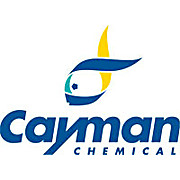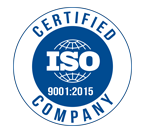Biologically Active Small Molecules
-
N-nonanoyl-L-Homoserine lactone
Cayman ChemicalA small diffusible signaling molecule produced by wild-type E. carotovora strain SCC 3193 involved in quorum sensing, controlling gene expression, and affecting cellular metabolism.
-
YM-58483
Cayman ChemicalA potent inhibitor of calcium release-activated calcium channels in lymphocytes (IC50 = 100 nM); also inhibits lung IL-4 and CysLT generation in animal models of asthma.
-
Paprotrain
Cayman ChemicalA selective, cell-permeable, reversible inhibitor of MKLP-2 (IC50s = 0.83-1.35 μM); treatment with 10-50 μM results in binucleated cells, perturbing relocation of Aurora B kinase and survivin to the central spindle in anaphase cells without affecting microtubule polymerization.
-
SC 26196
Cayman ChemicalA selective inhibitor of Δ6 desaturase (IC50 = 0.2 µM in a rat liver microsomal assay) that completely blocks the conversion of linoleic acid to AA; orally active in vivo, decreasing edema in the carrageenan paw edema model in mice.
-
Ochratoxin A
Cayman ChemicalA mycotoxin produced by A. ochraceus, A. carbonarius, and P. verrucosum that is commonly found as a food contaminant (Tolerable Weekly Intake = 100 ng/kg body weight per day); triggers nephropathy, induces renal adenomas, and initiates skin tumors through events involving oxidative stress,…
-
7-keto Cholesterol
Cayman ChemicalA bioactive sterol that can affect cholesterol homeostasis, membrane properties and cell survival; inhibits CYP7A1 with an IC50 = ~ 1 µM; can be used as a standard in the determination of cholesterol derivatives by GC-MS or HPLC.
-
Thiorphan
Cayman ChemicalA potent inhibitor of neprilysin, a membrane metallo-endopeptidase that cleaves peptide hormones, such as enkephalins, glucagon, and bradykinin (Ki = 4-140 nM); produced in vivo via the metabolism of the prodrug acetorphan.
-
Aflatoxin G2
LKT LabsAflatoxins are mycotoxins found in foods and livestock feeds that were initially produced by species of Aspergillus. Aflatoxin G2 is cytotoxic; it inhibits DNA synthesis and induces cell cycle arrest.
-
G-418 Sulfate
Cayman ChemicalAn aminoglycosidic antibiotic that is commonly used for the selection of genetically engineered cells neo neon toxic prokaryotic genes eukaryotic cells.
-
Bafetinib
Cayman ChemicalA Bcr-Abl kinase inhibitor (IC50 = 5.8 nM) that is 25- to 55-fold more potent than imatinib in vitro and ≥10-fold more potent in vivo; inhibits 12 out of the 13 most frequent imatinib-resistant Bcr-Abl point mutations, but not the T315I mutation; also targets the Src family kinase Lyn…
-
-
EA4
Cayman ChemicalA quinone derivative that inhibits red blood cell PLA2 with a Ki value of 130 µM.
-
Indirubin-3'-monoxime
Cayman ChemicalA potent inhibitor of GSK-3β (IC50 = 22 nM), preventing tau phosphorylation both in vitro and in vivo.
-
2,7-Dichlorodihydrofluorescein diacetate
Cayman ChemicalA fluorescent indicator of peroxynitrite formation; neither NO, superoxide, nor hydrogen peroxide alone appear to oxidize DCFH.
-
BEC
Cayman ChemicalL-Arginine serves as a common substrate for both NOS and arginase in the cell. NOS catalyzes the oxidation of arginine to citrulline and NO with Nω-hydroxy-L-arginine (NOHA) formed as an intermediate. Arginase, on the other hand, catalyzes the hydrolysis of arginine into urea and L-ornithine.…
-
Linolein Hydroperoxides
Cayman ChemicalLinolein hydroperoxides are a mixture of 132 possible isomers of mono-, di-, and tri-hydroperoxides produced from the autoxidation of trilinolein. Autoxidation of linoleic acid containing triglycerides (for example, trilinolein) in vivo could result in the formation of these hydroperoxides. Unlike…
-
XAV939
Cayman ChemicalA small molecule inhibitor of tankyrase 1 and 2 (IC50 = 11 and 4 nM, respectively); increases the protein levels of the axin-GSK3β complex and promotes the degradation of β-catenin; inhibits colony formation of APC-deficient colorectal cancer cells at 0.33 µM.
-
AS-703026
Cayman ChemicalSelectively inhibits MEK1/2; potently inhibits growth and survival of human INA-6 multiple myeloma cells and cytokine-induced osteoclast differentiation (IC50s = 10 and 18.2 nM, respectively); 30 mg/kg reduced tumor growth significantly in mice bearing H929 MM xenografts.
-
Besifloxacin Hydrochloride
LKT LabsBesifloxacin is a fourth generation fluoroquinolone antibiotic that displays broad-spectrum antibacterial activity against aerobic and anaerobic bacteria and is effective against a wide range of ocular pathogens that exhibit resistance to other fluoroquinolone antibiotics. Besifloxacin inhibits DNA…
-
PF-670462 (hydrochloride)
Cayman ChemicalA potent inhibitor of the CK1 isoforms CK1ε and CK1δ (IC50 = 7.7 and 14 nM, respectively); less effectively inhibits a wide variety of related or common kinases; disrupts circadian rhythms in cells and animals; blocks the locomotor response to amphetamines in mice.
-
CAY10680
Cayman ChemicalA benzothiazinone compound that selectively inhibits both MAO-B activity (IC50 = 34.9 nM in human) and adenosine A2A receptors (Ki = 39.5 nM in human); designed as a potential dopamine-sparing therapeutic in the treatment of Parkinson’s disease.
-
K252c
Cayman ChemicalK252c is a cell-permeable PKC inhibitor (IC50s = 2.45 and 25.7 µM for PKC and PKA, respectively). It induces apoptosis in human chronic myelogenous leukemia cancer cells. In human foreskin fibroblast cells, it reduces focus formation induced by human cytomegalovirus (HCMV) strains…
-
4ß-hydroxy Cholesterol
Cayman ChemicalA major oxysterol formed from cholesterol by CYP3A4/5; used as a marker for CYP3A4/5 activity.
-
Skepinone-L
Cayman ChemicalAn ATP-competitive inhibitor of p38 MAPK isoform p38α (IC50s = 5 nM) and p38β (97% inhibition at 1 µM); has little effect on a range of other kinases, including p38γ and p38δ; blocks the phosphorylation of HSP27, a p38 MAPK substrate, in response to…
-
GTP 14564
Cayman ChemicalAn inhibitor of class III receptor tyrosine kinases (IC50s = 0.3 µM for c-Fms, c-Kit, ITD-FLT3 and 1 µM for PDGFRβ); blocks the proliferation of leukemia cells stimulated with FLT3 ligand by preventing the activation of STAT5.
-
Adrenorphin
LKT LabsAdrenorphin is an endogenous opioid peptide produced from cleavage of proenkephalin A. Adrenorphin acts as an agonist at ?-opioid receptors (?ORs) and µ-opioid receptors (µORs). Like other opioids, adrenorphin exhibits analgesic, antinociceptive, and gastrointestinal motility modulating…
-
a-Naphthoflavone
Cayman ChemicalA flavone that modulates xenobiotic metabolism; antagonizes AhR at nanomolar concentrations, although it agonizes AhR at higher concentrations (10 µM); inhibits CYP19, CYP1A1, CYP1A2, and CYP1B1 (IC50s = 500, 60, 6, and 5 nM, respectively), whereas it activates CYP3A4 (Kd = 7.4 µM).
-
PF-04620110
Cayman ChemicalA potent and selective inhibitor of DGAT-1 (IC50 = 19 nM); has high oral bioavailability (100%) in rats with a moderate half-life of 6.8 hours; significantly blocks an increase in plasma triglyceride levels following a corn oil bolus in rats.
-
StemRegenin 1 (hydrochloride)
Cayman ChemicalA purine derivative that reversibly antagonizes aryl hydrocarbon receptor signaling (IC50 = 127 nM in CD34+ cells); induces a 50-fold increase in human embryonic stem cells expressing CD34 (EC50 = 120 nM) and a 17-fold increase in stem cells that retain the ability to engraft…
-
Sodium Phosphate Stock Solution (500 mM, pH 9.0)
Cayman ChemicalSodium Phosphate Stock Solution (500 mM, pH 9.0) contains filtered 500 mM sodium phosphate buffer. It is ready to use as supplied.
-
Cylindrospermopsin
Cayman ChemicalA cyanobacterial toxin that targets protein and glutathione synthesis in hepatocytes (IC50s = 1.3 and 2.4 µM, respectively), inhibits uridine monophosphate synthase complex activity (Ki = 10 µM), and induces DNA damage.
-
Darifenacin (hydrobromide)
Cayman ChemicalA receptor antagonist acting at the muscarinic receptors (Ki = 5.5, 47, 0.84, 8.6, and 2.3 nM for M1 through M5, respectively); effective in treating problems related to the lower urinary tract.



















